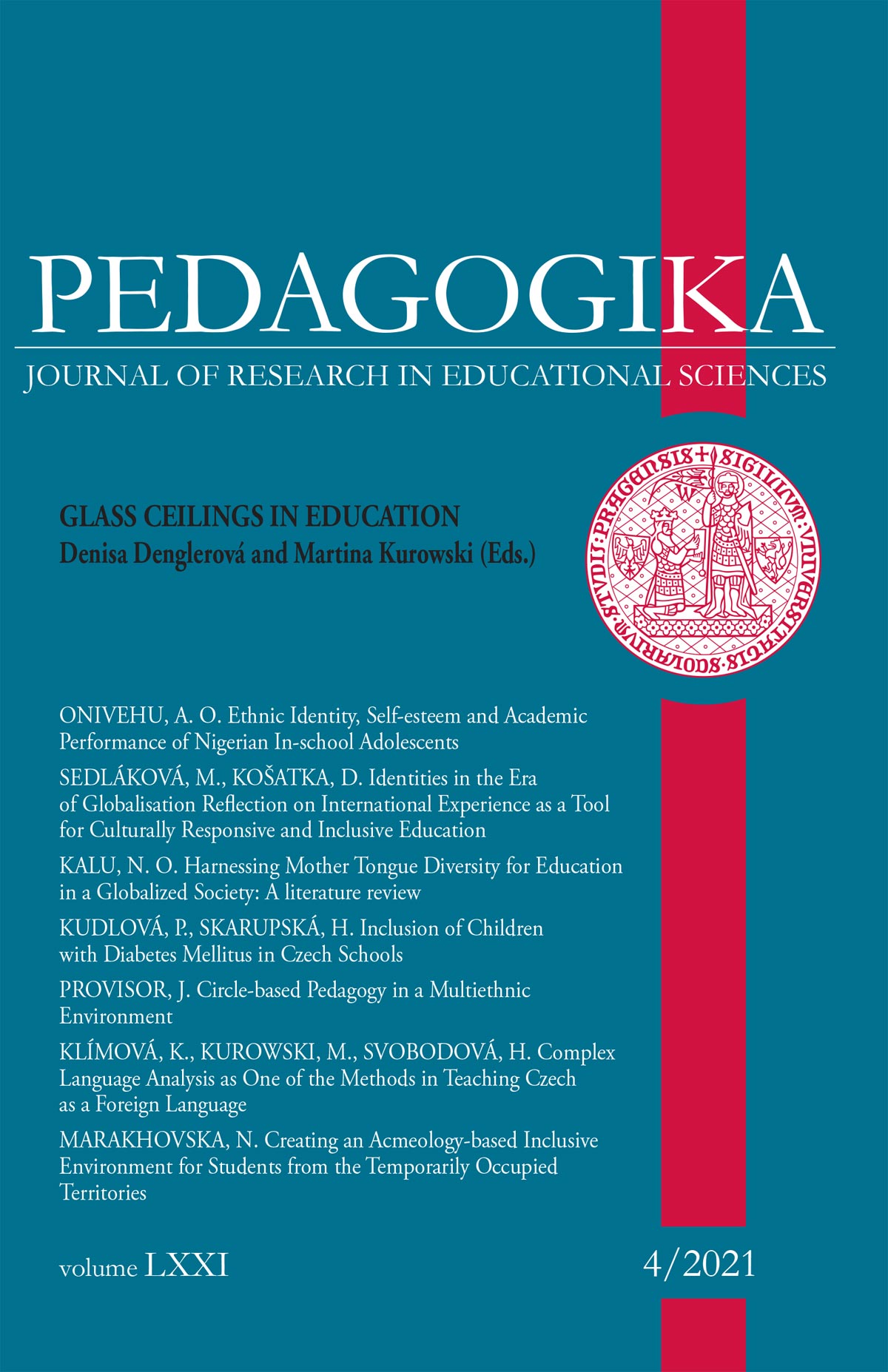Využití rozmanitosti mateřského jazyka pro vzdělávání v globalizované společnosti
DOI:
https://doi.org/10.14712/23362189.2021.1968Klíčová slova:
mateřský jazyk, rozmanitost, jazykové povědomí a vzděláváníAbstrakt
Různé kultury a jazyky překračují hranice, včetně globálního vzdělávacího prostoru, a proto je třeba vytvářet povědomí o kultuře a mateřském jazyce. V tomto článku jsme aplikovali teoretický výzkumný design, v němž se na základě přehledu vybraných článků diskutuje o nejlepších způsobech, jak lze využít rozmanitosti mateřských jazyků v našich školách k vytvoření univerzálního vzdělávacího systému, který snižuje nerovnosti ve vzdělávání, vede k hospodářskému růstu a soudržnosti. Představený přehled literatury hodnotí výzvy spojené s využíváním různorodosti mateřských jazyků. Text také diskutuje o výhodách využívání diverzity mateřského jazyka jako preferovaného řešení pro udržení kulturně inkluzivního vzdělávacího prostředí.
Reference
Asfaha, Y. M. (2020). Multilingual language policy discourses and superdiversity at the peripheries: Exploring language policy and practice in Eritrea. Journal of Multicultural Discourses, 15(4), 404-421.
https://doi.org/10.1080/17447143.2020.1771346
Bilgin, S. S. (2017). Language awareness: Are pre-service English teachers aware of "language awareness" and its implications? International Journal of Language and Linguistics, 4(3), 65-70.
Cantone, K. F. (2020). Immigrant minority language maintenance in Europe: Focusing on language education policy on teacher-training. International Multilingual Research Journal, 14(2), 100-113.
https://doi.org/10.1080/19313152.2020.1715541
Carrió-Pastor, M. L., & Vallés, I. T. (2015). A comparative study of the influence of the mother tongue in LSP and CLIL. Procedia - Social and Behavioral Sciences, 178, 38-42.
https://doi.org/10.1016/j.sbspro.2015.03.143
Dotzel, S., Bonefeld, M., & Karst, K. (2021). The impact of linguistic diversity on students' reading comprehension using different diversity measures and its' differential effects depending on students' migration background. International Journal of Educational Research, 109 (101796).
https://doi.org/10.1016/j.ijer.2021.101796
Edgar, R. E. (2017). Mother tongue based multilingual education challenges: A case study. Edelweiss Applied Science and Technology, 1, 10-23.
https://doi.org/10.33805/2576.8484.103
European Union (2020). Promoting cultural cohesion through language learning in Austria, Czechia. Available at https://ec.europa.eu/regional_policy/en/projects/Austria/promoting-cultural-cohesion-through-language-learning-in-austria-czechia.
Eurydice - European Commission. (2021). National Reforms in School Education. Available at https://eacea.ec.europa.eu/national-policies/eurydice/content/national-reforms-school-education-17_en.
Fowers, B. J., & Richardson, F. C. (1996). Why is multiculturalism good? American Psychologist, 51(6), 609-621.
https://doi.org/10.1037/0003-066X.51.6.609
Hartmann, D., & Gerteis, J. (2005). Dealing with diversity: Mapping multiculturalism in sociological terms. Sociological Theory, 23(2), 218-240.
https://doi.org/10.1111/j.0735-2751.2005.00251.x
Herzog-Punzenberger, B., Le Pichon-Vorstman, E., & Siarova, H. (2017) Multilingual education in the light of diversity: lessons learned. NESET II report. Luxembourg: Publications Office of the European Union.
Kirsch, C., Aleksić, G., Mortini, S., & Andersen, K. (2020). Developing multilingual practices in early childhood education through professional development in Luxembourg. International Multilingual Research Journal, 14(4), 319-337.
https://doi.org/10.1080/19313152.2020.1730023
Leite, S. (2021). Using the SDGs for global citizenship education: Definitions, challenges, and opportunities. Globalisation, Societies and Education.
https://doi.org/10.1080/14767724.2021.1882957
Lim, L., Tan, M. & Saito, E. (2019). Culturally relevant pedagogy: Developing principles of description and analysis. Teaching and Teacher Education, 77, 43-52.
https://doi.org/10.1016/j.tate.2018.09.011
Mägi, E., & Nestor, N. (2013). Students with different mother tongue and cultural backgrounds in Estonian schools: Attention, awareness and support at school level. Tallinn: Poliitikauuringute Keskus Praxis [Center for Policy Studies].
Martin, S., Minsong, K., & Larry, L. (2019). Affordances and constraints of communities of practice to promote bilingual schooling. Journal of Professional Capital and Community, 4(2), 82-106.
https://doi.org/10.1108/JPCC-01-2018-0003
Mizza, D. (2014). The first language (L1) or mother tongue model vs. the second language (L2) model of literacy instruction. Journal of Education and Human Development, 3(3), 101-109.
https://doi.org/10.15640/jehd.v3n3a8
Ndiribe, M. O., & Aboh, S. C. (2020). Multilingualism and marginalisation: A Nigeria diversity approach. International Journal of Multilingualism.
https://doi.org/10.1080/14790718.2020.1818752
Nishanthi, R. (2020). Understanding of the importance of mother tongue learning. International Journal of Trend in Scientific Research and Development, 5(1), 77-80.
Raz, J. (1998). Multiculturalism. Ratio Juris, 11(3), 193-205.
https://doi.org/10.1111/1467-9337.00086
Rizova, E., Bekar, M., & Velkovski, Z. (2020). Educational challenges of Roma minorities: The case of the Republic of North Macedonia. International Journal of Cognitive Research in Science, Engineering and Education (IJCRSEE), 8(3), 113-122.
https://doi.org/10.23947/2334-8496-2020-8-3-113-122
Scanlan, M., Kim, M., & Ludlow, L. (2019). Affordances and constraints of communities of practice to promote bilingual schooling. Journal of Professional Capital and Community, 4(2), 82-106.
https://doi.org/10.1108/JPCC-01-2018-0003
Tove, S. (2002). Why should linguistic diversity be maintained and supported in Europe? Some arguments. Guide for the development of language education policies in Europe from linguistic diversity to plurilingual education. Strasbourg: DGIV Council of Europe.
Tsai, I. I. (2019). The effect of peer collaboration-based learning on enhancing English oral communication proficiency in MICE. Journal of Hospitality, Leisure, Sport & Tourism Education, 24, 38-49.
https://doi.org/10.1016/j.jhlste.2018.10.006
Yamat, H. (2010). Managing linguistic diversity through informal and non-formal education. Procedia Social and Behavioral Sciences, 7(C), 707-713.
https://doi.org/10.1016/j.sbspro.2010.10.096
Zaidi, R. (2020). Dual language books: Enhancing engagement and language awareness. Journal of Literacy Research, 52(3), 269-292.



